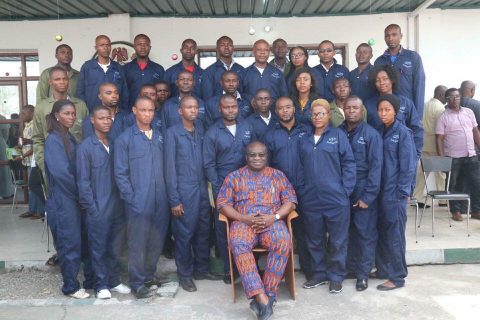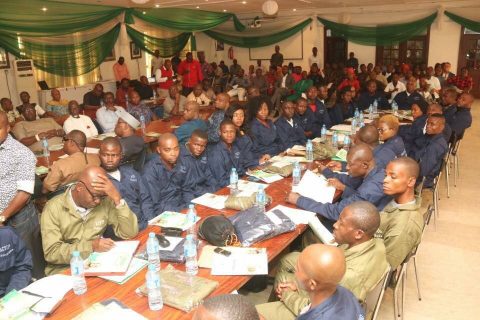

Made-In-Aba: 30 Aba Shoe Making Argonauts Depart To China – By John Okiyi Kalu
–
The original “Argonauts” were a band of heroes in Greek mythology, who in the years before the Trojan War, around 1300 BC, accompanied Jason to Colchis in his quest to find the Golden Fleece. Their name comes from their ship, Argo, named after its builder, Argus. Since then the word “argonauts” have become synonymous with pathfinders in history making expeditions.
In an article published August 13 2013, in response to the “deportation” of Igbo from Lagos to the South East region, C. Don Adinuba, a prolific writer of Igbo origin, penned the following lines on those we now consider as Igbo education argonauts:
“When the Great Zik of Africa returned from the United States in the 1940s with a string of degrees in diverse disciplines, he saw that the Igbo were lagging behind the Yoruba because Igboland is in the hinterland, far removed from the sea through which modernity came to our country. He did not induce in the Igbo a persecution or inferiority complex or demonise the Yoruba, but rather took far-sighted steps to make them leapfrog developmentally. He sent to the United States 9 promising Igbo young men, including K. O. Mbadiwe, Nwafor Orizu, Mbonu Ojike and Okechukwu Ikejiani, for further studies, and the “Argonauts”, in turn, sent their family members and relatives to the U.S.. This is the genesis of the Igbo dominance of the Nigerian community in the U.S. A gifted anthropologist, Zik recognized Igbo society thrives on village and town competition. He used the instrumentality of the Igbo State Union to promote the establishment of educational institutions by communities. Thus, “in one fantastic burst of energy”, as Chinua Achebe put it, “the Igbo wiped out their educational handicap”. By 1965, they had begun to compete with the Yoruba educationally. Meanwhile, Zik had recruited many village primary school teachers with a flair for writing and trained them as journalists on his West Africa Pilot. That’s how the Igbo came into journalism. Emmanuel Obiechina, the eminent professor of sociology of literature, did show in a compelling manner how this development led to the emergence of the first generation of intellectual novels and how the Igbo were in the forefront.
“As Eastern Nigerian premier, Zik operated far the lowest budget in the country because palm produce, the region’s economic mainstay, was attracting much lower prices than cocoa and groundnut, which were the main revenue earners for the other two regions. Yet, he was able to establish the Eastern Nigerian Development Commission, able to set up Nigeria’s first indigenous bank, Nigeria’s first full-fledged university, Nigeria’s first cement company, Nigeria’s first gas company, Nigeria’s first steel company, Nigeria’s first industrial estates in Enugu and Port Harcourt, etc. No wonder, Eastern Nigeria had the world’s fastest economy by 1966.”
On Thursday 4th of January 2018, Governor Okezie Ikpeazu of Abia State feted and sent forth 30 shoe makers from Abia state who were selected to travel to China to learn automated shoe making and return to the state to form the fulcrum of the emerging automated shoe making industries that are expected to soon dot the landscape of Abia State.
In many ways, Governor Ikpeazu appears to have keyed into the same vision of the great Zik of Africa in pursuing his passionate push for the accelerated growth of indigenous enterprises in the state, anchored on the promotion of Made In Aba brands.
Prior to his emergence as Governor of Abia State in 2015, Dr Okezie Ikpeazu articulated 5 pillars of development he will pursue to enhance the socio-economic wellbeing of the people of the state: Agriculture, Industrialization, Oil and Gas, Commerce and Education,
In a recent live radio interactive engagement with Abians via the Broadcasting Corporation of Abia State (BCA) Governor Ikpeazu pointed to his promotion of Made in Aba brands as possibly his biggest achievement in the 30 months of his governorship.
While many may not understand the premise of that statement, given that Governor Ikpeazu is also well known for the unprecedented road construction efforts of his administration that earned him the tag of “caterpillar revolutionary” and many other achievements in different sectors, it is actually with the promotion of local enterprises that he scored the golden goal.
With over 250,000 small and medium scale enterprises, Aba is well known and acclaimed as the number one SME hub of Nigeria. What appears to be lacking in that historical acknowledgement of Aba as the entrepreneurship capital of Nigeria is the lack of confidence of Aba craftsmen who make all sorts of things; ranging from leatherwork (shoes and bags) Fashion wears and accessories (clothes, beads etc) and equipment fabrication and credit other countries with the products of their craftsmanship.
Prior to the emergence of Governor Ikpeazu, Aba will make shoes or clothes and tag them “Made in Turkey” or even “Made in Senegal”. Equipments fabricated at Aba are sold as “Made in China” while Aba made wines and spirits are credited to South Africa or Spain and sold within and outside the country without acknowledging the ingenuity of our local manufacturers.
The story is now different.
With the focused and well planned promotion of Made in Aba brands by Governor Ikpeazu, today goods and services made in Aba are appropriately branded as “Proudly Aba Made”. Indeed this campaign has caught National and international attention to the extent that even manufacturers and tailors based in far away Lagos and elsewhere in Nigeria now struggle to identify their brands as “Aba made”.
International organizations like Ford Foundation have also taken note and sponsored global marketing campaigns for Made in Aba brands at CNN, among others, at no cost to the government of Abia State.
Yet we are still at the early stages of the focused promotion of local enterprises at Aba which has produced more than N1.6b in direct sales from the federal govt and other institutions.
The federal government of Nigeria, under the leadership of President Muhammed Buhari, have also keyed into the Made in Aba agenda with policy support and physical actions such as ensuring that 10,000 shops at Ariaria international market now have steady power supply courtesy of Rural Electrification Agency of Nigeria. An executive order was also signed by the Presidency to ensure that only goods without Aba made alternatives are procured by the agencies of government.
With the promotion of Made in Aba brands have come challenges of meeting increased orders in a timely and profitable manner. Automation of manufacturing processes is now an absolute necessity, especially in shoe making where orders of tens of thousands pairs of shoes have to be expeditiously serviced and delivered to specification.
After analyzing the challenges and future trends, Governor Ikpeazu decided to visit China last year to study their automated shoe making processes first hand and arrange for the training of the next generation of automated shoe makers of Aba that will man the soon to be opened shoe factories at Aba and train others.
The 30 shoe makers are therefore the argonauts of the automated Aba shoe making era at Aba who will, like Zik’s education argonauts, train others and mainstream modern shoe making at Aba.
The Government of Abia State, in addition to arranging for training locations and institutions in China, is paying for the flights and accommodation of the argonauts in China as well as providing them with stipends to take care of themselves while in China.
As pointed out recently by Governor Ikpeazu, promoting local enterprises is expected to support job creation in the state. For example, if each of the 250,000 local entrepreneurs directly employ 4 persons, we will have a minimum of one million new jobs in addition to other indirect jobs for transporters, traders, technicians, food sellers etc.
With improved job availability, many idle but highly intelligent and skilled Abia youths will be gainfully employed with crimes like armed robbery and kidnapping effectively checked to enable the government spend less on security and more on other programs such as infrastructure renewal in the state.
It is also expected that a prosperous Aba shoe maker will readily pay tax revenue to the state and help improve the internally generated revenue (IGR) inflows of the state that is crucial to continuing the development agenda of Governor Ikpeazu.
Similarly, the industrialization agenda of the administration, which also led to the establishment of the Enyimba industrial cluster, will benefit from the coming automation of shoe making at Aba.
In all, Governor Ikpeazu has once more shown remarkable vision in pursuit of his agenda to spread prosperity in Abia State. The same vision that led him to embark on reconstruction of key economic roads that lead to business clusters at Ariaria (Faulks road) fabrication hub at Poet Harcourt road and other entry points to the important commercial city of Aba. To date Governor Ikpeazu has completed more than 30 road projects in Abia State and currently working on more than 87 other roads which are at different stages of completion.
History was kind to the great Zik of Africa for sending out the 9 Igbo education argonauts and will certainly be kind to Governor Ikpeazu for sending out the 30 automated shoe making argonauts of Abia State.
To the 30 shoe making argonauts of Abia State, my advice to them is simply to remember what the Governor of Abia State, Dr Okezie Ikpeazu said to them:
“I’m sending you to China with a lot of confidence. Others will be going after you, don’t block their access.
You are our ambassadors in China, be worthy ambassadors and pay attention to your reason of going to China. God will see you through and it will be well with you.”
-John Okiyi Kalu wrote from Umuahia






